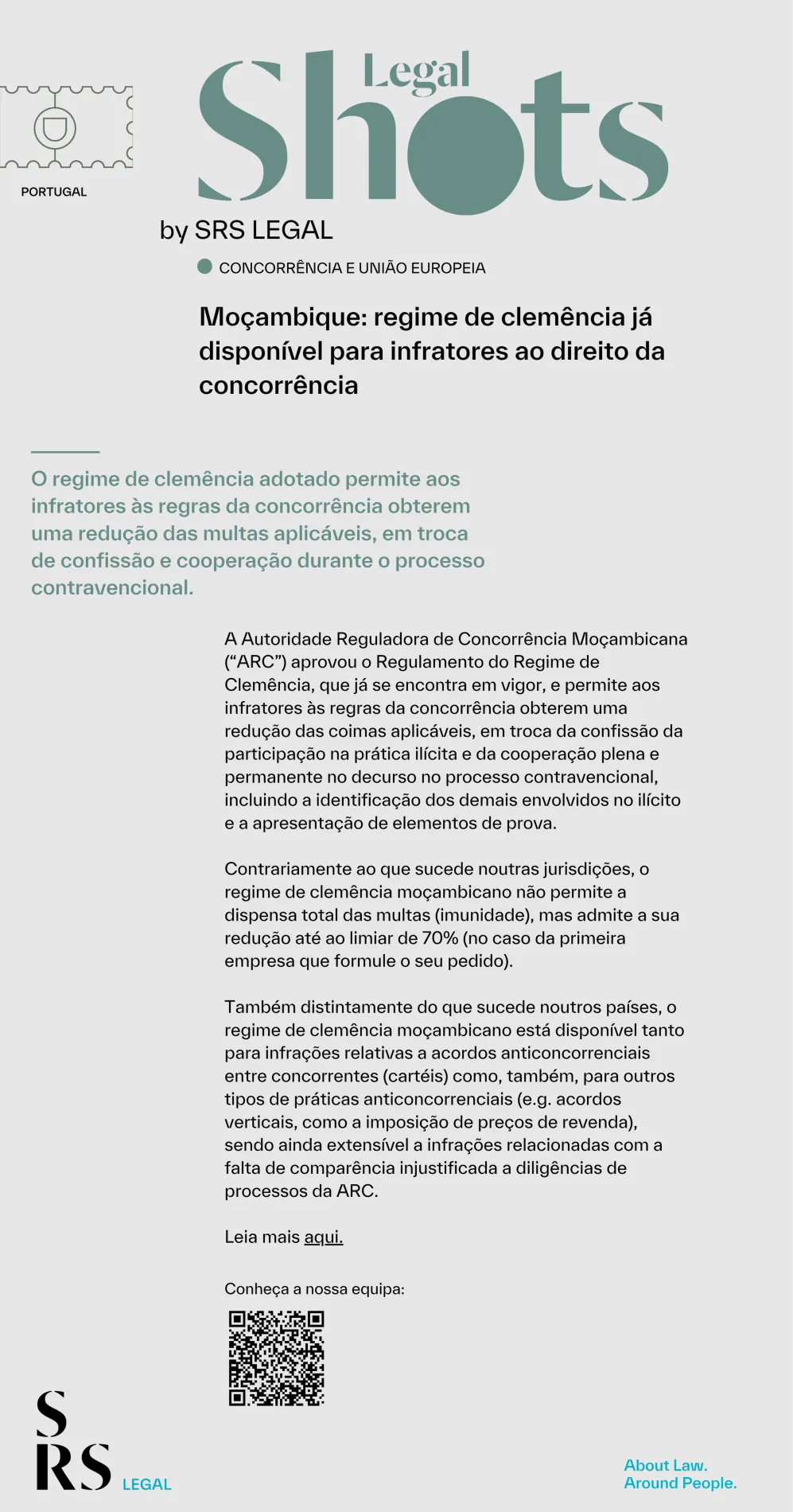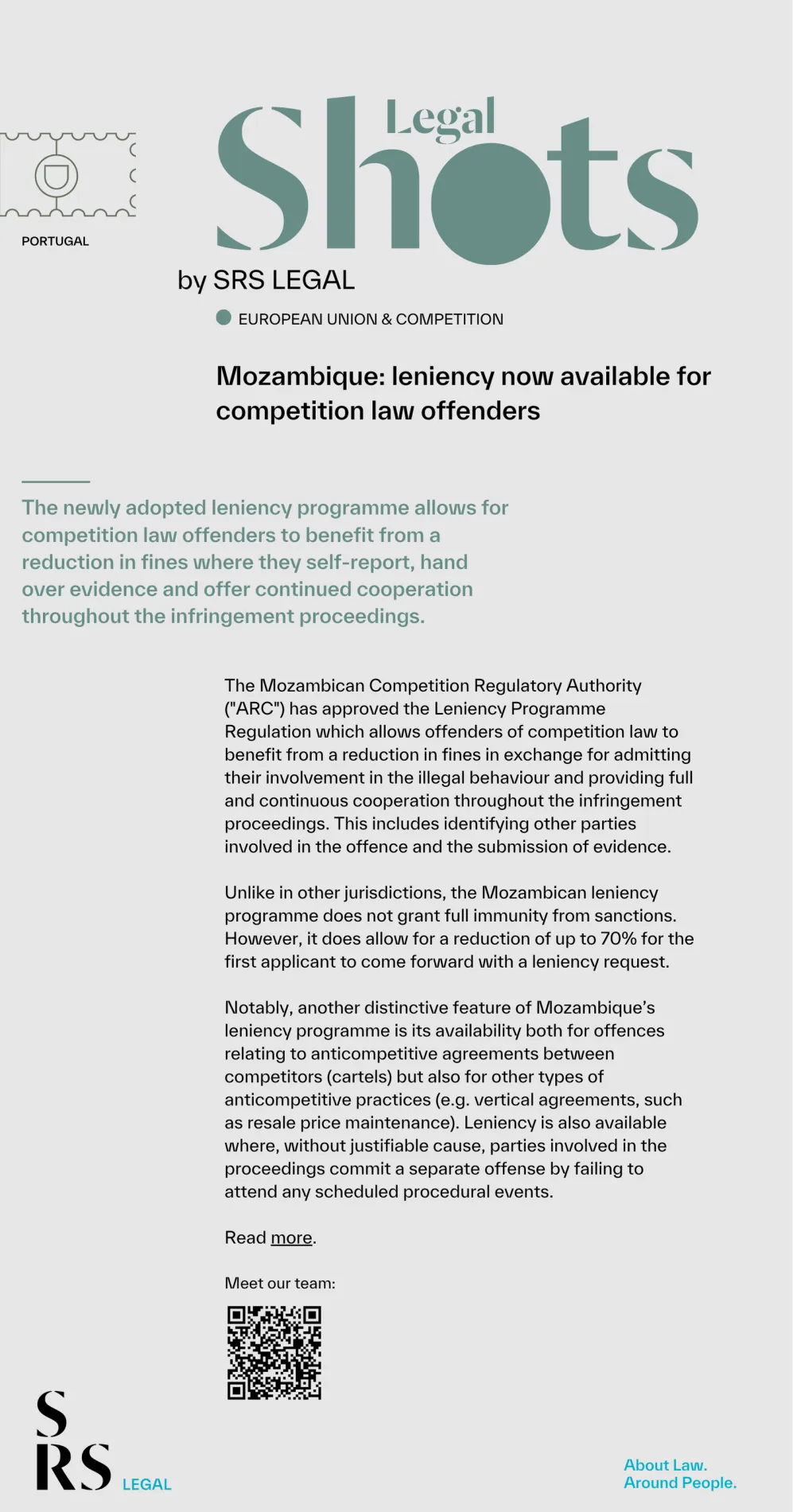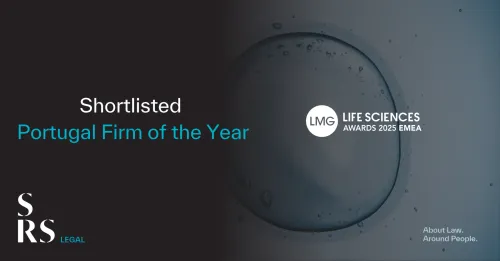Communication
SRS Legal Shots: Mozambique: leniency now available for competition law offenders
Resolution No. 1/2025, of 31 March, issued by the Competition Regulatory Authority ("ARC") was published in the Official Gazette of the Republic of Mozambique, formally approving the Leniency Programme Regulation. According to the Resolution, the Regulation entered into force with immediate effect.
The adoption of a leniency programme in Mozambique had already been foretold in the Mozambican Competition Regulation, approved by Decree No. 97/2014 of 31 December. Pursuant to this Regulation, the ARC was required to adopt a leniency programme that would allow for the reduction of fines imposed on companies or individuals, provided they collaborated in identifying other parties involved in the offence and in obtaining evidence that could corroborate the conducts under investigation.
The leniency programme as adopted by the ARC applies:
- to infringement proceedings initiated by the ARC concerning agreements and concerted practices between competitors (companies in a horizontal relationship) and between non-competitors (companies in a vertical relationship), as well as decisions by associations of companies which restrict competition;
- to leniency applications submitted by entities involved in an anticompetitive practice that has not yet been subject to infringement proceedings;
- to infringements for unjustified failure to attend ARC proceedings, by witnesses, experts or representatives of the complaining or infringing companies.
Given the concept of anticompetitive conduct outlined in the Mozambican Competition Act, to which it implicitly refers, the leniency programme also appears to apply to unilateral practices (abuse of dominant position) where a leniency request is made prior to the start of an infringement proceeding. This is a distinctive feature of the Mozambican system compared to other systems, particularly the Portuguese system (from which it draws inspiration), where leniency is only available for offences with a horizontal dimension.
An offender's eligibility for the leniency programme depends on the fulfilment of a set of cumulative conditions, including the admission of participation in the conduct and full and permanent cooperation with the ARC throughout the proceedings, complete and immediate cessation of their involvement in the practice at the time of submitting the leniency request (except, with express authorisation, in cases when cessation could compromise the effectiveness of the investigation), and the absence or insufficiency of evidence in the ARC's possession.
Another distinctive feature compared to other systems (such as the Portuguese or the European Union systems), where a leniency request may result in a full exemption from financial penalties, in the Mozambican system, a leniency request can only lead to a reduction in the applicable fines.
Therefore, offenders who meet all the conditions required for leniency may benefit from the following reductions in the fine amounts:
a) a reduction of 50 to 70% the fine amount for the first company;
b) a reduction of 30 to 50% inthe fine amount for the second company;
c) a reduction of 10 to 30% ofthe fine amount for the third company.
Leniency applicants are placed in the fine reduction tiers according to the rule of precedence in the submission of the leniency application. However, if the ARC determines that the information and evidence submitted by an undertaking is irrelevant, it may disqualify that company and grant the reduction to the next company that submits additional, significant evidence immediately after the disqualified company.
The leniency procedure begins at the request of the applicant company, which must be accompanied by information and evidence of significant added value, i.e. evidence which, by its nature and/or level of detail, enhances the ARC's ability to prove the alleged infringement by comparison with the evidence already in the ARC's possession.
The leniency application to be submitted to the ARC must contain, in addition to the accurate identification of the applicant, a clear and detailed description of the elements of the offence, including the identification of the companies and individuals involved, the indication of any other relevant information to the leniency application and the presentation of the evidence available to the applicant. Preference is given to the most recent or contemporaneous documents and information related to the infringement.
Upon receipt of the leniency application, the ARC conducts a preliminary assessment. If it determines that the evidence presented has significant added value, it informs the applicant of its intention to grant a reduction in the amount of the applicable fine, conditionally indicating the percentage range within which the reduction falls. The exact amount of the reduction to be granted, if any, is revealed in the final decision ofthe administrative offence proceedings.
In determining the amount of the fine reduction to be granted, the ARC considers several factors, including the duration of the infringement or the applicant’s involvement, the evidentiary value of the information and documents presented, the degree of the applicant’s participation in the infringement, the actions taken to terminate the infringement, the size and economical and financial condition of the companies and individuals involved, and the level of cooperation provided throughout the process.
If the ARC concludes that the information and evidence submitted is insufficient, it may, at any time, terminate the fine reduction procedure. In such cases, the ARC will return the provided materials to the applicant.
The application for leniency and all the information submitted within that context is classified as confidential and may not be disclosed to third parties, except in cases specifically required by law.
Leniency programmes are common procedural tools in the competition laws of various jurisdictions. Anticompetitive practices, by their nature and the ways in which they are implemented, are often secretive, making them extremely difficult for competition authorities to detect. The possibility of reducing fines (and, in some countries, waiving them altogether) serves as an incentive for companies to disclose their involvement in an anticompetitive practice, as it reduces the risk of higher fines being imposed. This, in turn helps competition authorities to detect such practices and, consequently, to enforce competition law more effectively.








